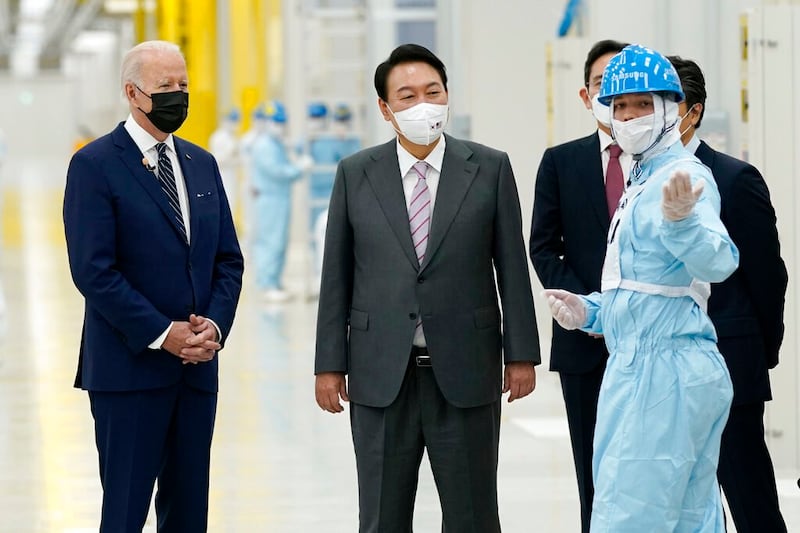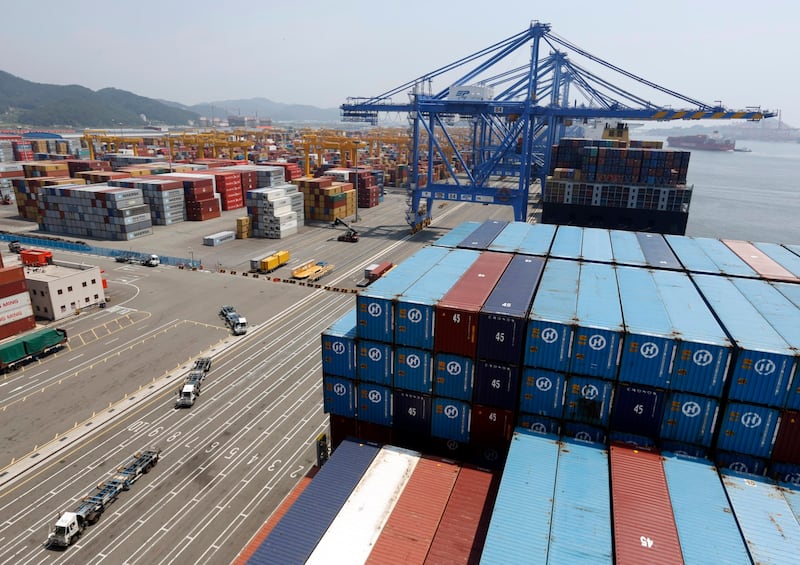U.S. President Joe Biden has embarked on a five-day trip to East Asia, his first visit to the region since he took office, to demonstrate the U.S. commitment to the Indo-Pacific amid the Ukrainian war and an increasingly assertive China.
The trip takes him to Seoul then Tokyo, where Biden is also expected to attend a summit of the Quadrilateral Security Dialogue, or Quad, that includes leaders of the U.S., Japan, India and Australia.
Yoon Seok-youl, who became the 13th president of South Korea earlier this month, said he is “confident the ROK-US alliance that seeks to uphold the values of democracy and human rights shall only elevate in the future.” ROK stands for the nation’s official name, the Republic of Korea.
The two presidents will have a 90-minute meeting on Saturday, during which they are expected to discuss North Korea’s nuclear capabilities and missile programs as well as economic and security cooperation.
One day before President Biden’s departure, U.S. National Security Adviser Jake Sullivan told a briefing that Biden "will see American and Korean troops standing shoulder to shoulder in defense of our collective security."
Sullivan also said that the U.S. is “prepared to make both short- and longer-term adjustments to our military posture as necessary to ensure that we are providing both defense and deterrence to our allies in the region and that we’re responding to any North Korean provocation.” He did not elaborate.
South Korea plays host to nearly 30,000 U.S. troops. Another 50,000 U.S. troops are based in Japan. Both nations are U.S. treaty allies.
Peter K. Lee, research fellow at the U.S. Studies Centre and Korea Foundation fellow at the University of Melbourne, Australia, said the timing of Biden's visit to Seoul, shortly after Yoon took office, “suggests that the White House sees an opportunity to re-energize the alliance between the U.S. and South Korea.”
“South Korea is the only U.S. treaty ally not present at either the recent U.S.-ASEAN special summit or upcoming Quad leaders' meeting so choosing Seoul for Biden's first visit to Asia is a way to demonstrate a high-level interest,” Lee told RFA.
Biden’s first stop after arriving in South Korea on Friday was a Samsung Electronics semiconductor plant.
“Biden's visit to Samsung's Pyeongtaek facility reflects his desire to increase closer industry cooperation with South Korea and attract investment in the U.S.,” said Lee from the University of Melbourne.
Besides Samsung, other Korean conglomerates including Hyundai, LG, and SK all have multi-million-dollar investment projects in the U.S., he added.

Indo-Pacific Economic Framework
After Seoul, Biden is set to travel to Tokyo, where he plans to have a meeting with Japanese Prime Minister Fumio Kishida on Monday and call on the Japanese Emperor Naruhito.
This visit to South Korea and Japan “would set a foundation for strong U.S.- South Korea relations, but also strengthening the trilateral partnership between the U.S., South Korea and Japan,” said Stephen Nagy, senior associate professor at the Department of Politics and International Studies, International Christian University in Tokyo.
Japan-South Korea ties have been badly strained over disputes stemming from Japan’s colonization of the Korean Peninsula in the first half of the 20th century.
In Tokyo on Monday, Biden is expected to announce a new U.S.-led initiative – the Indo-Pacific Economic Framework (IPEF) - that seeks to foster ties with economic partners in the region by setting trade rules and building supply chains.
Both South Korea and Japan are likely to become the first signatories of the framework, alongside other U.S. allies and partners: Australia, New Zealand, the Philippines and Singapore.
“Japan's standpoint on the IPEF is the same as South Korea. They clearly support any U.S. engagement within the region,” said Nagy.
“They see the IPEF that focuses on standards, the digital economy, as well as other evolving areas of governance to be really critical in creating the rules of the road of how we use new technologies and the new economies such as digital economy.”
“They also see it as a tool to anchor the United States into the Indo-Pacific region over the long term,” Nagy told RFA.
In the case of South Korea, a recent report by the RAND Corporation think-tank said that new President Yoon's vision is "strengthening democratic alliances and becoming a focal point in a supply chain oriented toward democratic states."
“South Korea already has the KORUS FTA Free Trade Agreement with the U.S. and is a natural fit for the high-end economic cooperation envisioned under the IPEF such as clean energy and digital trade,” said Lee from University of Melbourne.

Countering China
China has already warned against what Beijing calls “the U.S. attempt to lure countries in the region to decouple from China.”
The Chinese Foreign Ministry's spokesman Zhao Lijian told reporters on Thursday that "China always believes that any regional cooperation framework should avoid targeting third parties and undermining their interests."
But a firm foothold of the United States in the Indo-Pacific “has been the long-term interest of Japan and South Korea, and frankly, other political entities such as Taiwan,” said Nagy in Tokyo.
“They see a permanent presence of the U.S. as a positive force for both countries in ensuring that China does not dominate the region,” he said.
Analysts say China will feature high on bilateral and multilateral talks during the U.S. president’s trip, especially as tensions have been building up recently in the Taiwan Strait.
China has been conducting live-fire drills around Taiwan and on Thursday announced that a military exercise would be held in a large area in the South China Sea, north of Paracel Islands, from May 19 to May 23, which coincides with Biden's visit.
With his new vision mapped out, Yoon will have to perform a careful balancing act.
The RAND report said Yoon “will need to manage his ideological inclinations and pressure from the United States to act against China, but also maintain good trading relations with China to maintain South Korea’s economic growth.”
China is South Korea’s largest trading partner, accounting for 27 percent of its total exports in 2021.
“South Korea’s trade is to a high degree in the hands of China and this will limit what Yoon can do in practice,” the report said.
Yet “Yoon's vision of South Korea as a "global pivotal state" will increase expectations that South Korea plays a more active role in upholding international norms that better reflects Korean public sentiment on issues like support for Ukraine,” said Lee.
“Last year's Biden-Moon summit was the first to mention Taiwan in the joint statement and was swiftly criticized by China,” Lee said, referring to Yoon’s predecessor as South Korean president, Moon Jae-in.
“It will be interesting to see how much further Yoon goes in his joint statement with Biden this time.”
